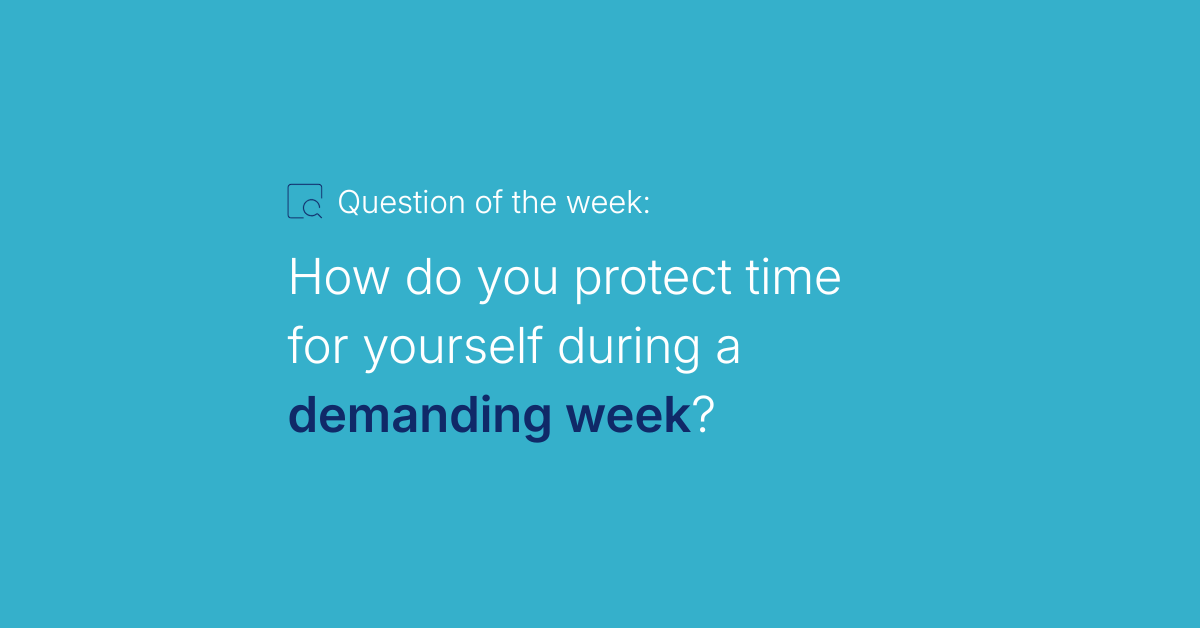
How do practitioners maintain work-life balance in busy weeks?
Work-life balance isn’t just a buzzword—it’s a real challenge for practitioners. Between packed schedules and constant demands, it's easy to become fully absorbed in work, but that doesn’t mean personal time has to fall by the wayside. With burnout affecting a large part of the medical community, taking time for self-care is just as critical as caring for patients.
Whether it’s waking up early, diving into a hobby, or simply stepping away for lunch, small choices can make a big difference.
Keep reading to discover how our community protects time for themselves, then log in or sign up to see the Consensus and share your own.



 Question of the week
Question of the week
 Consults
Consults
Key takeaways about maintaining work-life balance as a practitioner:
- Schedule personal time like a meeting
Whether it’s early mornings, lunch breaks, or weekend getaways, protect time by blocking it off in the calendar, treating it with the same priority as patient appointments or meetings. - Set boundaries and stick to them
Saying no to non-essential meetings and limiting any work communications during breaks can help reinforce personal boundaries. - Recharge with activities that contrast with work
To recharge, practitioners engage in hobbies and activities that drastically differ from their clinical roles—such as scuba diving, writing fiction, or meditation.
Family Practice
"The easiest time to protect for myself is in the early morning hours. While it is hard to wake up before everyone else, it is worth it because there are no distractions."
Family Practice
"I stay away from the desk, computer, and phone during lunch time, at least for half an hour.
I also take short vacations every 2-3 months and go away for 2 days every month if possible.
Exercise daily and get enough sleep. Out of Saturday and Sunday, save one day just for yourself."
Dermatology
"I always leave time in my monthly schedule for breaks and occasional vacations. I consider this my protected time. I rarely eat into them. To accommodate emergencies and other demands, I also build 3 x 30-minute slots into my weekly schedule that only open 5 days before they come up. These always wind up filling, but allow me to see emergencies in such a way that I don't have to eat into my protected time off."
Internal Medicine
"My early career as a trauma specialist was my job and my recreation. 12 years later, after transitioning to internal medicine, I gave myself every weekend off, adding a Friday every other week (we had a great group for covering).
I became a Master Scuba Diver Trainer and dove every weekend for many years with my wife, wife and students, or even alone. Never answered a call in the ocean! GREAT nurses and junior associates made all of the possible. Now I write short stories and Murder Mystery books. In essence, the secret to my longevity and love for my job is that my recreation in no way resembles my job."
Family Practice
"I have scheduled times for Pilates & there is $30 no-show fee. I also pack gym clothes & leave the office in them. Just became an empty nester - AKA successful launcher- and I do not have as many home commitments. I have also learned to say no to meetings & events that are not mandatory."
Psychiatry
"I make time to exercise each morning, no matter how busy the work week. I also schedule at least 20 to 30 minutes for lunch during the day at a minimum. And I make sure that I have things to look forward to in terms of hobbies or socializing or spending time with family after the workday in the evening."
Cardiology
"I wake up earlier in order to complete my work and have time for myself. If it is a demanding week, I tend to wake up anywhere from 3:30 to 4:30 am. If my census is normal, I usually wake up at 6 am."
Oncology/Hematology
"I try to exercise every day — the gym represents a time to recharge, meditate, and stay healthy. It’s a natural mood enhancer, appetite suppressant, and social event, all at a very reasonable cost."
Obstetrics/Gynecology
"I take breaks during work hours at fixed times, and when I do so, I leave my office. I will still answer calls but will remind the staff that I am not immediately available."
Unspecified/Other
"I protect time for myself by scheduling personal activities, like exercise, meals, or quiet time, into my calendar with the same priority as meetings or patient care. Setting clear boundaries and saying no when necessary helps ensure I have space to recharge and maintain balance."
Read all of the ways practitioners protect their work-life balance on the full post on Healthcasts, then share yours.

